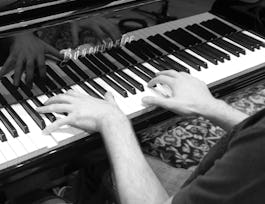After a tremendous response from learners on Coursera, Berklee Online has created a Developing Your Musicianship specialization, and this course is the third course in the series. If you have a general understanding of music theory or if you have completed Developing Your Musicianship I and II, this course will continue to help you understand musical concepts, enabling you to create and perform contemporary music. Taught by Berklee College of Music professor George W. Russell, Jr., the course includes four lessons that delve into an intermediate level of harmony and ear training.


Musicianship: Tensions, Harmonic Function, and Modal Interchange
This course is part of Developing Your Musicianship Specialization
Taught in English
Some content may not be translated

Instructor: George W. Russell, Jr.
Top Instructor
27,441 already enrolled
Included with 
Course
(396 reviews)
97%
Recommended experience
What you'll learn
Describe Chord tensions and their role
Describe The concept of Harmonic Function
Aurally identify chord progressions and chord qualities
Identify Modal Interchange chords in a composition
Skills you'll gain
Details to know

Add to your LinkedIn profile
5 quizzes
Course
(396 reviews)
97%
Recommended experience
See how employees at top companies are mastering in-demand skills

Build your subject-matter expertise
- Learn new concepts from industry experts
- Gain a foundational understanding of a subject or tool
- Develop job-relevant skills with hands-on projects
- Earn a shareable career certificate


Earn a career certificate
Add this credential to your LinkedIn profile, resume, or CV
Share it on social media and in your performance review

There are 5 modules in this course
Welcome to Musicianship: Musicianship: Harmonic Function, Modal Interchange, and Tensions (also known as Developing Your Musicianship III)! Here we will cover all the details about the course and what you'll need to know to get the most out of your course experience.
What's included
1 video4 readings1 quiz1 discussion prompt
This week, we will explore the key of Eb Major and B minor. We will also learn about chord tensions and harmonic function, or, in other words, how chords function within a tonal center. We will continue to develop our ears by aurally identifying chord progressions and chord qualities.
What's included
6 videos2 readings1 quiz1 peer review
This week, we will explore learn a new chord progression, the I II- V I. If you took Developing Your Musicianship, you may remember the VII-7b5, but this week, we'll learn about diminished chords. We'll also continue to train our ears to hear chord progressions and qualities.
What's included
5 videos3 readings1 quiz1 peer review1 discussion prompt
This week, we will explore the concept of modal interchange, or borrowing chords from a parallel tonality. We'll also learn a new chord progression that showcases modal interchange, the bVI bVII I progression. Finally, we will continue to train our ears to hear chord progressions and qualities.
What's included
5 videos2 readings1 quiz1 peer review
This last lesson will focus on preparing you for your final course project: writing and performing a 16-bar song. We will run through a brief overview of the concepts you have learned over the past few weeks that you will be able to apply when you complete your project. We will also learn about suspended chords and we will continue our ear training practice.
What's included
8 videos3 readings1 quiz1 peer review
Instructor

Offered by
Recommended if you're interested in Music and Art
Why people choose Coursera for their career




Learner reviews
Showing 3 of 396
396 reviews
- 5 stars
91.66%
- 4 stars
5.30%
- 3 stars
2.02%
- 2 stars
0.50%
- 1 star
0.50%

Open new doors with Coursera Plus
Unlimited access to 7,000+ world-class courses, hands-on projects, and job-ready certificate programs - all included in your subscription
Advance your career with an online degree
Earn a degree from world-class universities - 100% online
Join over 3,400 global companies that choose Coursera for Business
Upskill your employees to excel in the digital economy
Frequently asked questions
Access to lectures and assignments depends on your type of enrollment. If you take a course in audit mode, you will be able to see most course materials for free. To access graded assignments and to earn a Certificate, you will need to purchase the Certificate experience, during or after your audit. If you don't see the audit option:
The course may not offer an audit option. You can try a Free Trial instead, or apply for Financial Aid.
The course may offer 'Full Course, No Certificate' instead. This option lets you see all course materials, submit required assessments, and get a final grade. This also means that you will not be able to purchase a Certificate experience.
When you enroll in the course, you get access to all of the courses in the Specialization, and you earn a certificate when you complete the work. Your electronic Certificate will be added to your Accomplishments page - from there, you can print your Certificate or add it to your LinkedIn profile. If you only want to read and view the course content, you can audit the course for free.
If you subscribed, you get a 7-day free trial during which you can cancel at no penalty. After that, we don’t give refunds, but you can cancel your subscription at any time. See our full refund policy.





